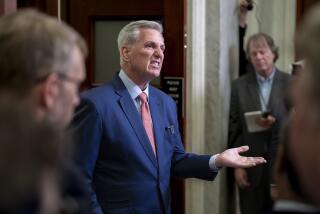Boehner: Bondholders should be paid first if debt limit breached
- Share via
WASHINGTON -- House Speaker John A. Boehner said holders of U.S. government bonds should be paid first if the nation’s debt limit is breached, even if that means that China would get preference over the salaries of U.S. troops.
Boehner (R-Ohio) defended a Republican bill set for House consideration Wednesday that would order the Treasury Department to prioritize payments if the nation exceeded its statutory debt limit.
The bill comes as congressional Republicans and President Obama prepare for another showdown over raising the debt limit as soon as this summer.
“Our goal here is to not default on our debt,” Boehner told Bloomberg Television on Tuesday. “I think doing a debt prioritization bill makes it clear to our bondholders that we’re going to meet our obligations.”
QUIZ: Test your knowledge about the debt limit
Interviewer Peter Cook asked if that meant the Treasury would pay China, the largest foreign holder of U.S. government debt, before U.S. troops, as Democrats have charged the legislation would require.
Boehner reiterated that holders of U.S. debt should take priority.
“Listen, those who have loaned us money, like in any other proceeding, if you will -- court proceeding -- the bondholders usually get paid first,” he said. “Same thing here.”
The White House on Monday formally threatened to veto the Full Faith and Credit Act, arguing as it has in the past that the debt limit applies to spending already done by the U.S. government.
It accused House Republicans of “political gamesmanship” on the debt limit.
“American families do not get to choose which bills to pay and which ones not to pay, and the United States Congress cannot either without putting the nation into default for the first time in its history,” the White House said.
The legislation is unlikely to advance in the Democratic-controlled Senate.
The U.S. reached its $16.4-trillion debt limit at the end of last year, but accounting maneuvers by the Treasury Department allowed the U.S. to continue borrowing until a deal was struck as part of the fiscal cliff negotiations to put off the battle until later this year.
Congress temporarily suspended the debt limit until May 18, when it would need to be raised.
The Treasury Department again would be able to juggle the nation’s finances to buy some time. In addition, improved economic growth and higher tax revenue this year will delay the need to raise the debt limit.
The Bipartisan Policy Center projected last month that the government would run out of borrowing power sometime between mid-August and mid-October.
The Treasury Department has not provided an estimated date as Republicans and Democrats maneuver in the political battle over raising the limit.
Republicans reportedly are considering tying an overhaul of the tax code with raising the debt limit. Boehner did not rule that out.
“We’re just starting to have our conversations with the members,” he told Bloomberg Television.
“And we’re going to have a robust conversation about how do we best address this debt ceiling that we’re probably going to have to vote on sometime this summer,” he said. “Everything’s on the table in terms of consideration.”
ALSO:
Dow continues to sizzle, topping 15,000 for the first time
Home builders struggling to find enough construction workers
House Speaker Boehner unlikely to support Internet sales tax bill
More to Read
Inside the business of entertainment
The Wide Shot brings you news, analysis and insights on everything from streaming wars to production — and what it all means for the future.
You may occasionally receive promotional content from the Los Angeles Times.











